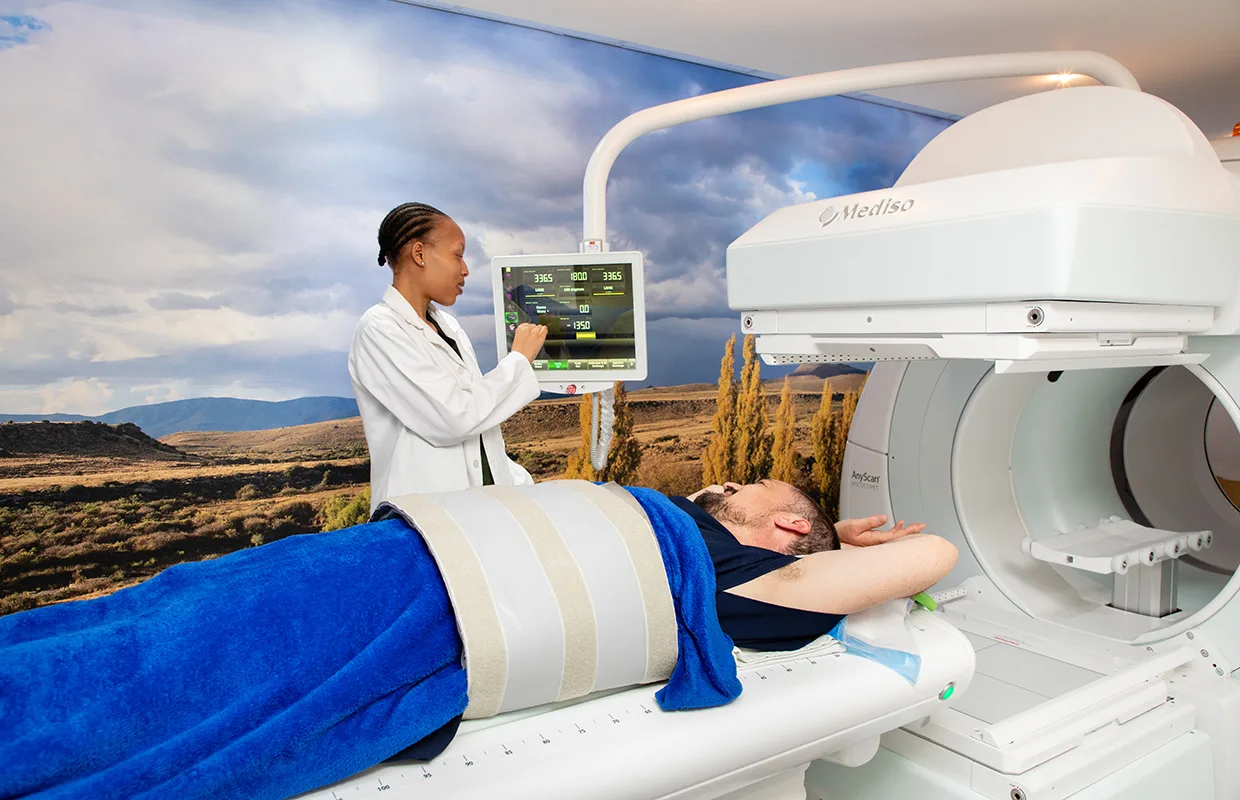Life Healthcare Group, a leading private healthcare provider in Southern Africa, exemplifies the profound impact of an unwavering commitment to quality patient care and innovation. With over four decades of experience, the group is driven by a mission to transform patient outcomes. Chief Executive, Peter Wharton-Hood, shares insights into this inspiring journey.
A VISION FOR A HEALTH REVOLUTION
The healthcare system in South Africa (SA) is a complex tapestry woven from two distinct sectors – a vast public system serving over 80 percent of the population and a well-resourced private sector catering for higher-income groups and those with medical insurance.
This duality reflects the country’s socioeconomic realities but also underscores the potential for collaboration. The public sector provides essential services, especially in rural and underserved areas, but faces challenges – long waiting times, staff shortages, and limited access to advanced technologies. Conversely, the private sector offers comparably First World, high-quality care.
The strengths inherent in both sectors have the potential for innovative public-private partnerships. Sustainable healthcare reform hinges on leveraging the best of both worlds – ensuring equitable access, improved outcomes, and long-term viability across all communities. A resilient healthcare system benefits everyone by increasing cost effectiveness and broadening access to quality care.
“Our goal is to build a healthcare system that works for everyone,” opens Peter Wharton-Hood, Chief Executive of Life Healthcare Group (Life Healthcare).
“We believe that collaboration between all parties is the key to unlocking the full potential of healthcare in SA.”
PRIVATE EXCELLENCE TO PUBLIC REFORMS
The private healthcare sector exemplifies excellence – offering high-class services, state-of-the-art facilities, and shorter waiting periods. These advantages are primarily funded through medical aid scheme membership, allowing patients access to advanced treatments and specialised care.
Life Healthcare supports the objective of the National Health Insurance (NHI) Act in terms of increasing access for all South Africans to high-quality, cost-effective healthcare. However, Life Healthcare has expressed grave concerns regarding the NHI Act and does not believe that in its current construct it will deliver on the overall objective.
It believes a more effective approach requires a significant strengthening of the public sector and healthcare personnel as well as collaboration with the private sector, leveraging the available capacity and resources to address the healthcare challenges facing SA more effectively.
Despite progress, challenges such as healthcare personnel shortages persist, necessitating ongoing efforts in both the public and private sector to train, retrain, and deploy skilled professionals across the country.
As a leading private healthcare provider in SA, Life Healthcare exemplifies this commitment to quality and innovation. With over four decades of experience, its network across SA, Botswana, and Namibia offers a comprehensive range of services.
“We are committed to not only providing excellent healthcare but also building capacity within the system,” states Wharton-Hood.
“Our investment in training and development ensures we meet the future needs of our communities.”
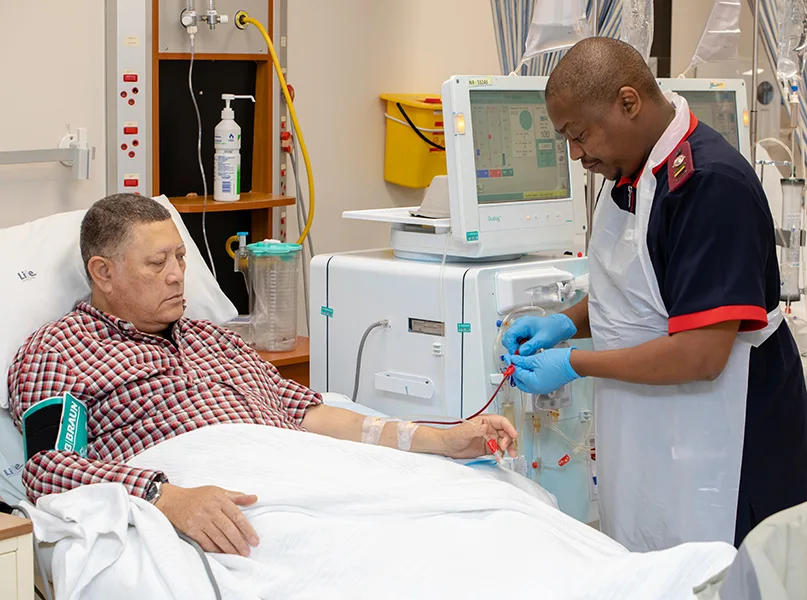
ELEVATING STANDARDS
Life Healthcare’s integrated strategy links its hospitals and complementary, specialised services to deliver high-quality services with an emphasis on patient-centred care.
Its comprehensive offerings include acute hospital services, specialised acute rehabilitation, renal dialysis, oncology, diagnostic imaging, radiology, nuclear medicine, and mental health and health risk management.
With a legacy built on trust and innovation, the group continuously strives to meet evolving patient needs.
“Our diverse range of healthcare services is tailored to address various medical conditions using advanced, modern technology and skilled staff,” Wharton-Hood affirms.
Aligned to its strategy, Life Healthcare was the first South African hospital provider to make all quality indicators per facility public on an annual basis. With quality being one of the key strategic pillars, continually improving the safety and quality of care is core to the group’s mission.
Life Healthcare is committed to helping patients make the best possible decisions by providing them with clear, transparent insights. The group strongly believes that reporting on quality measures not only drives it to continuously improve and uphold the highest clinical standards but also provides patients with the necessary insights to be at the centre of their care pathway decision-making process.
“Our commitment to quality is demonstrated through international certifications, transparent reporting, and innovation-driven initiatives. For instance, our investments into value-based care (VBC) models have achieved improved clinical outcomes, enhanced the patient experience, and reduced overall costs to the schemes, aligning incentives for better health,” explains Wharton-Hood.
Mental healthcare is also a critical focus, with enhanced acute mental healthcare services aimed at supporting individuals during some of their most challenging times.
In addition, Life Healthcare offers renal dialysis treatments, ensuring patients with chronic kidney disease receive compassionate and effective care.
“Our oncology services provide comprehensive cancer treatment plans, whilst our diagnostic imaging capabilities utilise the latest technology for accurate and timely results. Furthermore, the group excels in nuclear medicine, providing innovative diagnostic and therapeutic solutions,” he acclaims.
A commitment to health risk management services is equally noteworthy, encompassing occupational health and wellness programmes that not only enhance employee health but also foster safer working environments.
This holistic approach underscores Life Healthcare’s dedication to delivering exceptional medical care and support for the well-being of individuals and communities alike.
“Quality is one of our key strategic pillars, and continually improving the safety and quality of care is at the core of our culture”
Peter Wharton-Hood, Chief Executive, Life Healthcare Group
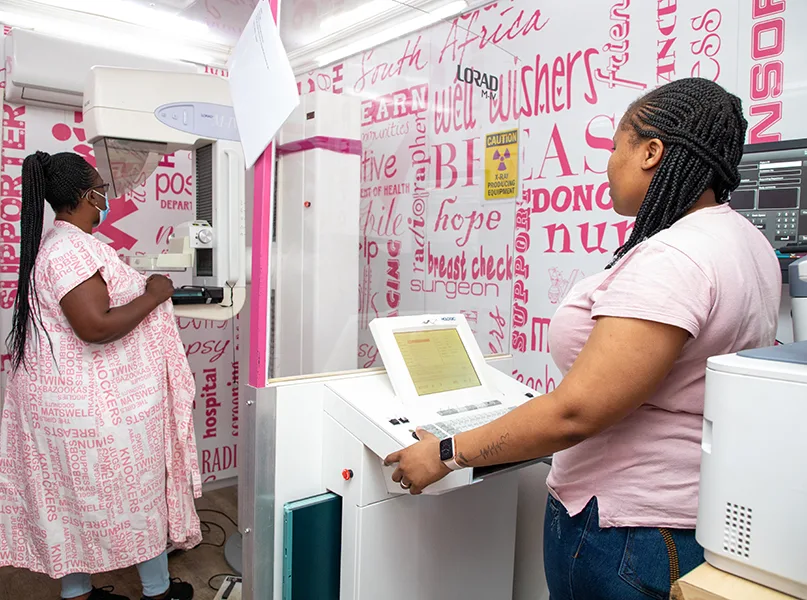
ADVANCEMENTS IN CARE
Innovation is central to Life Healthcare’s vision. Recent initiatives exemplify this, including:
Nuclear medicine and advanced imaging facilities: More people are surviving cancer today than ever before, with better awareness, early detection, and improved treatments all playing a part.
However, there is another, often overlooked, contributor to this progress – medical imaging. Specifically, positron emission tomography-computed tomography (PET-CT) is a powerful scan that is quietly changing outcomes – Life Healthcare is investing in two additional scanners to its current network of three, one at Life Vincent Palloti Hospital and another at Life Hilton Private Hospital.
These state-of-the-art facilities will improve diagnostic accuracy and enable earlier, more effective treatment of cancer patients.
One of the biggest challenges in treating cancer is knowing exactly where it is, how aggressive it might be, and how it is behaving. Traditional scans, like X-rays, CTs, and magnetic resonance imaging (MRI), show the structure of the body and the size and shape of tumours or abnormalities, but they can’t always help doctors to determine whether those abnormalities are cancerous or how metabolically active the cancer really is.
“That is where PET-CT makes a difference. It combines the two types of scans into one, capturing three-dimensional images of the body’s biological functions to help doctors pinpoint the location of tumours or cancerous lesions, assess the extent of disease, determine whether lesions are benign or malignant, and identify any potential spread,” explains Wharton-Hood, adding that PET-CT is not used for all cancers of all patients.
“Its role depends on your specific diagnosis, the type of cancer, and how the treatment plan is structured, but for many cancers – including lymphoma, lung, breast, head and neck, colorectal, gynaecological, prostate, and melanoma – PET-CT is becoming integral in cancer care.
Radiopharmaceuticals: The installation of two cyclotrons in Gauteng to produce radiopharmaceuticals will result in a steady and reliable supply of radioisotopes used in molecular imaging and nuclear medicine. Isotypes are critical components for PET-CT and single photon emission computed tomography (SPECT)-CT scans.
The availability of locally produced radiopharmaceuticals will support the integration of advanced nuclear imaging services into cancer care.
Furthermore, this introduces the first vertically integrated molecular diagnostics service, ranging from producing isotopes to injecting and scanning patients, in Southern Africa. Through this partnership, the reliance on international access to isotypes will be reduced.
“This initiative is part of our broader strategy to enhance our oncology services and provide cutting-edge diagnostic tools for cancer care,” Wharton-Hood adds.
Cutting-edge imaging and surgical technology: A new interoperative MRI (iMRI) theatre – one of only 500 in the world and the only purpose-built iMRI in SA – is available at Life Groenkloof Hospital.
This purpose-built neurosurgery theatre is fully integrated with the most sophisticated neuroimaging MRI. The MRI scanner can be moved into the operating room, or the patient can be moved to the MRI room, allowing for real-time imaging without compromising the sterile environment.
“Having the MRI machine in theatre means that the images help the surgeon in real-time to see exactly where the tumour is and how much of it has been removed. If parts of the tumour remain, we then continue the resection, repeating until completed,” explains Wharton-Hood.
“This is a huge step forward for complex neurosurgery, allowing our surgeons to tackle more complex cranial and spinal procedures with increased confidence, resulting in better clinical outcomes by reducing the likelihood of repeat surgeries and minimising the risk of complications.”
Artificial intelligence (AI)-driven radiotherapy: The AI-driven Ethos radiotherapy system at Life Vincent Palloti Hospital enables daily adaptive treatments, minimising side effects and improving cancer care outcomes.
“This innovative system allows treatment plans to adapt to patients’ daily anatomical changes in real time, ensuring the precise targeting of tumours whilst minimising radiation exposure to healthy tissues. Unlike traditional methods that require time-consuming rescanning and replanning over two days, the Ethos system completes the process within 20 to 30 minutes, enhancing the efficiency and accuracy of radiotherapy treatments,” Wharton-Hood informs us.
By personalising radiation treatments according to the unique anatomy of each patient on the day of their procedure, the Ethos system significantly enhances patient outcomes. This means less visits to the hospital, improving the overall patient experience.
“With a focus on individualised care, it empowers healthcare providers to deliver more effective and compassionate radiation therapy tailored to the specific needs of every patient,” Wharton-Hood says.
The Ethos radiotherapy system at Life Vincent Pallotti Hospital is already being used to treat patients with cervical, rectum, lung, and prostate cancer. In time, other cancers are hoped to be included in the treatment programme.
Robotic surgery: The Da Vinci Xi system, recently upgraded at Life St George’s Hospital, allows minimally invasive procedures across multiple disciplines, enhancing accuracy, reducing trauma, and shortening recovery times.
The system translates a surgeon’s hand movements in real time, ensuring unmatched accuracy. Its robotic-assisted instruments bend and rotate beyond human capability, enabling intricate procedures through tiny incisions.
High-definition, 3D magnified imaging provides unparalleled clarity, allowing for meticulous surgical execution.
“Through this technology, we are elevating our dedication to patient-centred care and promoting the best clinical outcomes in a number of surgical disciplines, including urology, gynaecology, general surgery (for procedures such as hernia repair), colorectal, thoracic, cardiac, and head and neck surgeries,” Wharton-Hood shares.
Similarly, orthopaedic surgeons at Life Hilton Private Hospital and Life Wilgeheuwel Hospital are utilising the Robotic Surgical Assistant (ROSA) system designed for performing knee and hip replacements, providing better joint longevity.
“Our investment in these cutting-edge technologies demonstrates our commitment to leading healthcare innovation,” states Wharton-Hood.
“By adopting the latest advancements, we are not only improving patient outcomes but also setting new standards in healthcare delivery in SA.”
This suite of innovations exemplifies Life Healthcare’s dedication to leveraging technology to improve patient outcomes and operational efficiencies.

NAVIGATING HEALTH HURDLES
Despite notable achievements, the private healthcare sector faces ongoing challenges:
- Challenging economic conditions – rising costs and unemployment.
- Stagnant medical insurance market.
- Workforce shortages – particularly nurses and doctors.
- Hospital management complexities.
- Insured market provider consolidation trends.
“Addressing these hurdles requires a proactive and collaborative approach,” says Wharton-Hood.
“Our strategy focuses on three core elements – growing, driving, and optimising our business – to ensure it is best positioned for sustainable shareholder returns and growth in market share.”
Growth initiatives focus on expanding facilities via greenfield and brownfield projects, strategic acquisitions, and new service lines.
The upcoming development of a new hospital in Paarl exemplifies this, promising to bolster local access and stimulate community employment.
“The Life Paarl Valley Hospital project is testament to our long-term commitment to community health,” Wharton-Hood asserts.
“It will create jobs, improve healthcare access, and contribute to local economic growth.”
STRENGTH IN UNITING FORCES
As SA’s healthcare landscape evolves, collaboration becomes more crucial.
“We must continue to strengthen partnerships with government and other stakeholders to improve healthcare accessibility and affordability,” urges Wharton-Hood.
“Closer cooperation between public and private sectors is vital to overcoming challenges and improving service delivery. Our Life Nkanyisa initiatives exemplify this, providing healthcare to the most vulnerable public patients on behalf of the government.”
Strategic alliances and community-focused programmes amplify impact. Corporate social investment (CSI) is an integral part of Life Healthcare’s ethos, reflecting its commitment of being closely involved with the communities it serves.
“We are dedicated to social upliftment, and our CSI initiatives embody our purpose of making life better,” he adds.
As a leading player in the delivery of healthcare, the group is uniquely positioned to enhance health outcomes across Southern Africa and empower communities to take ownership of their health on both individual and collective levels.
Strategically significant programmes are managed at the national level, whilst other CSI initiatives are driven by local needs. The group’s three primary focus areas are healthcare access, education and training, and community upliftment.
“Our partnership with the South African National Council for the Blind (SANCB), spanning two decades, delivers mobile eye care to rural and peri-urban areas, significantly improving access for underserved populations,” notes Wharton-Hood.
Life Healthcare’s support since 2006 has enabled 79,000 screened patients to date through four mobile eye clinics fitted with mobile ophthalmic equipment.
The mobile screening provides essential eye examinations where glasses are also provided with referrals made for further treatment. The programme has seen 24,000 cataract surgeries undertaken with provincial hospitals in rural and peri-urban areas.
Since 2018, Life Healthcare has been the sole sponsor of SANCB’s Optima College, which provides vocational and life skills training for visually impaired students and trains 120 students annually in a one-year Sector Education and Training Authority (SETA)-accredited programme.
The curriculum includes essential topics such as computer skills, contact centre support, business administration services, and braille literacy. Additionally, over 250 students have benefitted from various short courses offered by the college.
To enhance the learning experience, computer laboratories have been established in seven training centres, equipped with adaptive software, printers, and internet connectivity.
More recently, collaborations with Operation Smile and PinkDrive exemplify the group’s commitment to indigent populations.
Lives are being transformed through Operation Smile’s surgical procedures for children with cleft lips and palates; Life Healthcare’s recent support goes far beyond financial assistance for these children.
“Our sponsorship is an investment in the future of these children. It means once they’ve recovered and healed from their surgery, they will no longer be bullied, teased, or outcast in their communities because of their cleft deformity,” says Wharton-Hood.
In partnership with PinkDrive, SA’s best-known mobile cancer screening not-for-profit company, Life Healthcare has supported mobile screening and education tours to rural and peri-urban areas.
These tours provide mammography, cervical pap smears, and prostate-specific antigen (PSA) screening and tests to disadvantaged state patients and their communities by using mobile mammography trucks.
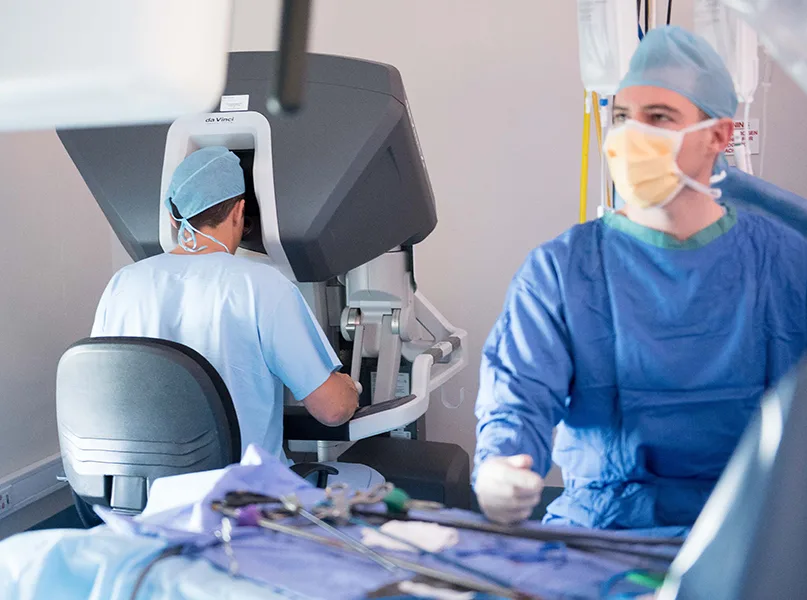
This enables PinkDrive to significantly enhance public health, ensuring more people benefit from early detection.
In addition to this ongoing support, Life Healthcare has just renewed its commitment to PinkDrive to deliver critical mammography services at Dr George Mukhari Academic Hospital in support of the Gauteng Department of Health.
“Investing in healthcare infrastructure and technology remains critical to meet increasing demand,” he adds.
“Our VBC models have proven effective in improving outcomes and reducing costs.”
VBC emphasises the importance of collaboration, communication, and coordination amongst healthcare professionals to ensure patients receive comprehensive and personalised care that meets their specific needs.
This approach recognises that healthcare is a complex system and that addressing patients’ physical, mental, and social needs holistically leads to better outcomes and overall well-being.
In the current private healthcare system, doctors and hospitals are mostly reimbursed for the volume of patients they see or procedures they do.
VBC shifts the focus from volume of services to quality and value, encouraging healthcare providers to prioritise preventative care, early interventions, and evidence-based practices.
“Through the success of our integrated renal care programme piloted in 2022, we were pleased to have negotiated our first renal VBC contract with leading medical schemes (health insurance funders),” Wharton-Hood tells us.
The contract promotes improved patient outcomes and shared value whilst providing the patient with the financial structure for the holistic care that they require.
Additionally, the programme focuses on giving patients with chronic kidney disease a better understanding of their condition and their treatment, ensuring they do not feel alone on their renal dialysis journey.
This has resulted in better management of chronic renal conditions, reduced hospital admissions, and improved overall health outcomes.
“Value is created through the enhancement of the patient experience and improvement of quality of care and patient outcomes,” insights Wharton-Hood.
Looking ahead, Life Healthcare is committed to evaluating future investments aligned with industry trends – such as AI, diagnostics, and nuclear medicine – aimed at enhancing patient care and operational efficiency.
“Increased adoption of preventative measures, early detection, and integrated care models will shape the future, where hospitals, clinics, and diagnostic units work seamlessly together to provide comprehensive care,” he predicts.
“Our focus remains on innovative, inclusive solutions that make quality healthcare accessible to more individuals.”
“We ensure that patients receive quality healthcare tailored to their individual needs through improved clinical and quality outcomes, efficiency, and an outstanding patient experience”
Peter Wharton-Hood, Chief Executive, Life Healthcare Group
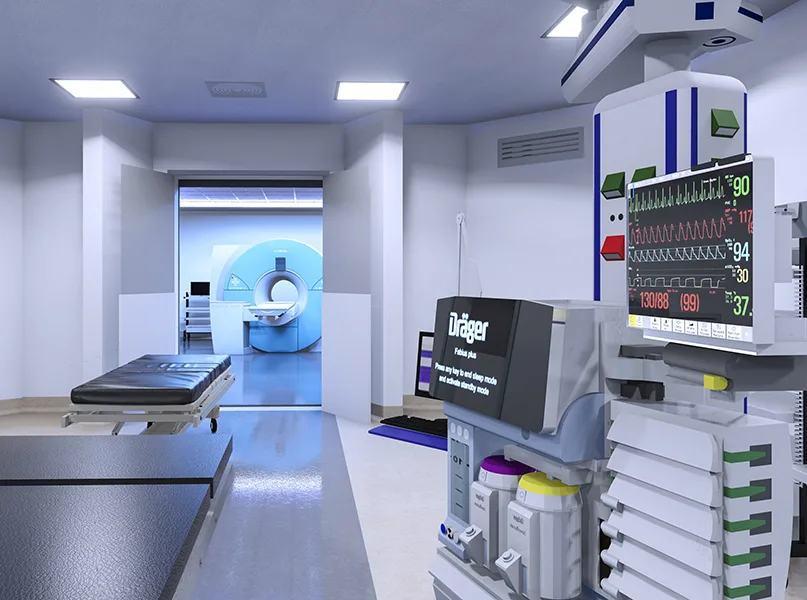
POSITIVELY IMPACTING COMMUNITIES
This collaborative approach not only stimulates economic growth but also reinforces Life Healthcare’s commitment to Broad-Based Black Economic Empowerment (B-BBEE), fostering equitable participation across its sectors.
“When examining our investment in nuclear medicine, our joint venture with AXIM Group, namely Axim Life Isotopes, enhances local radiopharmacy capabilities whilst reducing reliance on imports,” Wharton-Hood explains.
Further expanding its footprint, Life Healthcare is building a 140-bed hospital, reflecting strong financial health and community commitment.
The upcoming Life Paarl Valley Hospital, opening in 2027, promises to be a catalyst for revitalisation, offering modern facilities and community amenities.
As the second private acute hospital in the Paarl region and the only facility offering specialised cardiac services, it is poised to attract patients from the larger Boland area.
It will offer a comprehensive range of specialist services, including a cardiac catheterisation laboratory, cardiothoracic unit, intensive care unit (ICU), paediatric ICU, and neonatal facilities, amongst other specialist services and a 24-hour emergency unit.
An estimated 60 specialist doctors and allied professionals will be provided practice opportunities at the hospital. Furthermore, employment of nursing and support services staff will contribute to a total employment impact of approximately 360 jobs. The facility is being designed with future expansion in mind to accommodate growing healthcare needs.
Throughout its journey of growth and innovation, Life Healthcare has exemplified resilience.
“Our recent divestments, including the sale of AMG and Life Molecular Imaging (LMI), have unlocked significant shareholder value and strengthened our financial position,” Wharton-Hood notes.
“Our disposal of AMG in 2024 for ZAR21 billion received the Dealmakers Deal of the Year Award, recognising an almost two-year effort in structuring and executing a transaction that took almost 19 months and spanned circa 21 international jurisdictions.”
Life Healthcare’s disposal of LMI only a year later for upfront and potential earn-outs of ZAR13.5 billion was also a significant milestone.
“Navigating challenges whilst delivering growth energises us to continually improve. Our vision is clear – making life better for all through excellence, innovation, and collaboration,” Wharton-Hood outlines earnestly.
Life Healthcare stands at the forefront of transforming healthcare delivery in Southern Africa through its commitment to quality, patient-centred care, and innovative approaches by addressing disparities in access and emphasising a culture of continuous improvement.
The group is not only enhancing the lives of individuals but also advocating for a more equitable healthcare landscape.
As the private healthcare sector continues to navigate its challenges, Life Healthcare’s strategic focus on VBC and collaboration will pave the way for sustainable healthcare solutions that benefit all members of the community.
Ultimately, the future of healthcare in the region depends on organisations such as Life Healthcare that prioritise excellence and inclusivity in their mission to deliver exceptional medical services.
“Central to our current and ongoing success into the future is the resilience, dedication, and unwavering support of our employees and nurses, as well as our partnership with doctors and other healthcare professionals who continue to show unlimited loyalty and trust in Life Healthcare. Trust is essential to our success, and we are dedicated to upholding it through our purpose of making life better,” concludes Wharton-Hood.
LIFE HEALTHCARE PARTNERS




